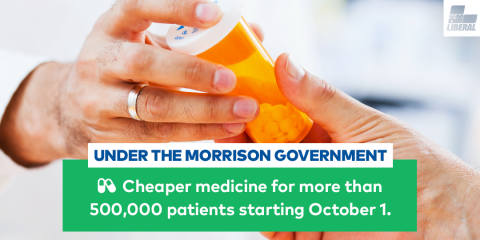Cheaper medicine for over 500,000 patients

Cheaper medicine is on the way for more than 500,000 patients from October 1, with price reductions for common scripts and new medicines added to the Pharmaceutical Benefits Scheme (PBS), in some cases saving over $100,000 per patient.
Medicines to treat lung cancer, lymphoblastic and acute leukaemia, and nausea associated with chemotherapy will now be available to patients on the PBS from tomorrow for just $40.30 per script, or $6.50 with a concession card.
A further $390 million in mandated price reductions across 175 medicine brands will also flow through to patients, making medicines more affordable.
Federal Member for Mitchell, the Hon Alex Hawke MP welcomed the announcement, saying the “new affordability will save more lives.”
“This is a significant announcement that reinforces the Morrison Government’s commitment to a healthier Australia,” Alex Hawke said.
“These price reductions will put more money back in Australian’s pockets. Patients will save and taxpayers will save.
The new or extending PBS listings from tomorrow include:
- Tecentriq® and Avastin®, will be extended on the PBS to include first line treatment of patients with stage IV metastatic non-squamous non-small cell lung cancer. Without PBS subsidy it would cost patients more than $11,400 per script (around 16 scripts per course of treatment); or more than $189,100 per course of treatment. An average of 755 patients per year (for six years) could benefit from this listing.
- Besponsa®, will be extended on the PBS to include patients with relapsed or refractory Philadelphia chromosome positive B-ALL. Without PBS subsidy, patients would pay more than $44,500 per script (around 3 scripts per course of treatment); or more than $122,900 per course of treatment without subsidised access through the PBS. An average of 16 patients per year (for six years) could benefit from this listing.
- Blincyto®, will be extended on the PBS to include patients with relapsed or refractory Philadelphia chromosome positive B-ALL. Without PBS subsidy, patients would pay more than more than $74,900 per script (around 2 scripts per course of treatment); or more than $122,900 per course of treatment. An average of 16 patients per year (for six years) could benefit from this listing.
- Aprepitant Apotex®, will be made available through the PBS for the treatment of patients with Nausea and vomiting associated with chemotherapy. Without PBS subsidy, patients would pay more than $80 per script (around 1 script per course of treatment). In 2018, 7,269 patients accessed a comparable treatment for this condition.
Fifteen common medicines - sold as 175 medicine brands will be cheaper for general (non-concessional) patients, and these include:
- Pregabalin: around 208,000 patients per year who have seizures or nerve pain will now pay $28.27 per script for 75 mg capsules, a saving of up to $5.11 per script
- Ezetimibe: around 60,000 patients per year with high cholesterol levels will now pay $33.86 per script for 10 mg tablets, a saving of up to $6.44 per script
- Ezetimibe with Simvastatin: about 245,000 patients with high cholesterol levels will now pay $37.77 per script for 10 mg tablets, a saving of up to $2.53 per script.
Every medicine was recommended to the PBS by the independent expert Pharmaceutical Benefits Advisory Committee. By law the Federal Government cannot list a new medicine without a positive recommendation from the PBAC.
From 1 January 2020 the threshold to receive free or further discounted medicines through the PBS will be lowered by 12 scripts for pensioners and concession card holders and the equivalent of 2 scripts for non-concession card holders.
Since 2013, the Morrison Government has listed over 2,100 new or amended items on the PBS. This represents an average of around 31 listings per month – or one each day – at an overall cost of around $10.6 billion.
Our plan for a strong economy continues to deliver record funding for essential health services that saves lives.
